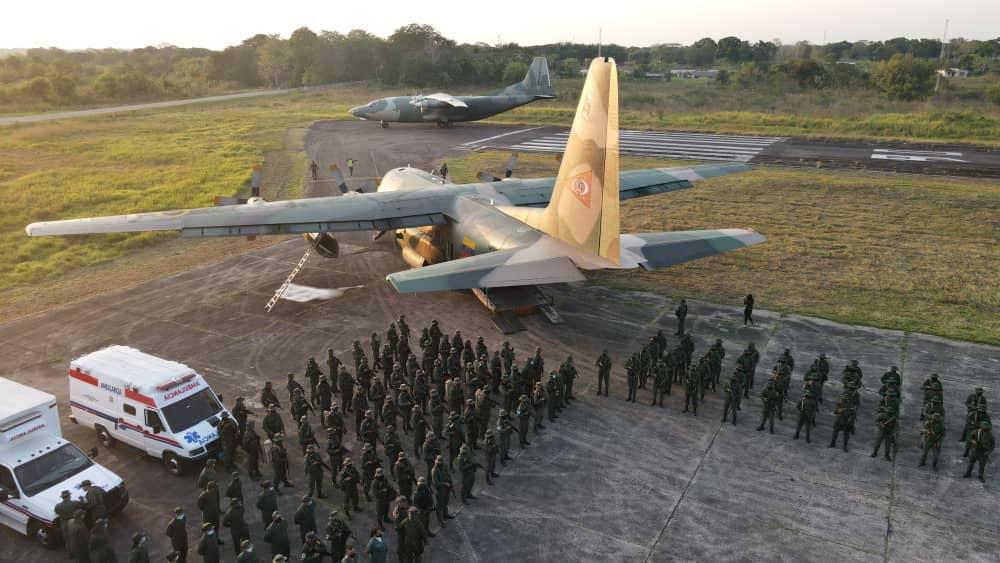
Venezuela & Colombia Deploy Troops to Border Region amid Renewed Tensions, Reported Incursions
Mérida, January 17, 2022 (venezuelanalysis.com ) – Venezuela's Armed Forces have reinforced their presence in the southern border state of Apure after popular organizations reported an incursion from irregular armed Colombian groups.
The military's response comes in addition to the start of the Bolivarian Shield 2022 exercises being held in other parts of the country. While it is unclear how many troops have been sent to Apure, reports indicate that soldiers, airplanes, helicopters and armored trucks from numerous other regions were deployed to the border area on Sunday.
Tensions have returned to Apure this year after dozens died in fighting in 2021. The exact identity of the irregular armed Colombian groups blamed for the violence is unclear, but sources claimed that a 300-strong offensive from Colombia's National Liberation Army (ELN) guerrilla took-over towns in Arauca department (Colombia) and Páez municipality (Apure state, Venezuela) during the past two weeks. The leftwing ELN has waged a battle against the Colombian state since 1964 and was previously allied to the Revolutionary Armed Forces of Colombia (FARC) which demobilized in 2016.
Other reports allege recent confrontations on the border region between the ELN and the dissident Tenth Front of the FARC, which did not subscribe to the 2016 peace agreement.
Colombian authorities claim to have discovered 27 bodies in Arauca department between January 2 and 5, as well as a tripling of forced displacements between January 12 and 14. Colombian President Iván Duque, who visited Arauca on Sunday to oversee a local security council meeting, has likewise sent two additional battalions to the region to bolster security.
For its part, Caracas announced the arrest of six people in a hotel in La Victoria, Páez municipality on Thursday for allegedly belonging to Colombian armed organizations. According to the unconfirmed claims, two of those arrested were also Venezuelan policemen.
Previous Next la-victoria-apure-1-1_0_0.jpg Páez municipality in Venezuela's Apure state has seen heightened tensions over the past two weeks. (Wikipedia) fjpqxnbwyau0-la_0.jpg Armored trucks and planes were also deployed. (@dhernandezlarez / Twitter) fjpqw-owyag-wpb_0.jpg It is unclear how many troops have been sent. (@dhernandezlarez / Twitter) fjpqxv7wuagrysh_0.jpgPopular organizations in Páez municipality further denounced that a group of 50 armed combatants“took-over” the La Gabarra sector of Guasdualito, as well as the Gran Unión and Víctor Díaz Ojeda communes, on Friday. The communes form part of the Simón Bolívar Socialist Communal City on the border region.
Some locals likewise claimed that armed men had requisitioned food, vehicles and other goods from farmers, while the mayor denounced that they had cut off internet connections.
In the statement released on Sunday through the Bolívar-Zamora Revolutionary Current (CRBZ), which is a current within the ruling United Socialist Party (PSUV), local organizations pointed the finger at ELN and former-FARC“renegades.”
The communiqué goes on to claim that the incursion constitutes an“unacceptable violation of [Venezuela's] national sovereignty [and] serves the purposes of the Colombian oligarchy and US imperialism [to] control drug-running border routes.” The organizations declared themselves in“peaceful, democratic and patriotic resistance” and called on the Venezuelan government to act.
For its part, the CRBZ, which is a key political force in the area, later issued statements backing the troop deployment and linking the localized destabilization to Colombia's upcoming presidential election in May.
Violence flared up on the Colombo-Venezuelan border in April and May last year, leaving at least sixteen Venezuelan soldiers and dozens of armed Colombians dead, while also prompting Caracas to seek international mediation .
At the time, Caracas blamed imported“imperialist agents” for the violence, while local residents denounced human rights abuses from Venezuela's security forces. On-the-ground sources claimed that former-FARC rebels were to blame for sparking the confrontation.
“Part of the Colombian oligarchy's strategy is to infiltrate our country with armed drug-running terrorist groups, better known as TANCOL,” President Maduro claimed in September.“They aren't guerrilla fighters nor paramilitaries, they are TANCOL, groups of up to 100 people who have been trained and financed in Colombia. They come across the border to make a profit off internal security situations, to attack the people, to traffic Colombian cocaine and to prepare attacks,” he went on to say. In December, Maduro further vowed to“clear the country of TANCOL 100%” during 2022.
The porous 2,200-kilometer Colombia-Venezuela border has traditionally had a strong presence of numerous different insurgent groups fighting the Colombian state, as well as a large binational population . Expert Danna Urdaneta argues that the complex border dynamics should not be over-simplified and that“it is essential to study the war that started in Colombia but that previous Venezuelan governments and combatants took on as a common conflict.”
MENAFN17012022000214011058ID1103552790

Legal Disclaimer:
MENAFN provides the
information “as is” without warranty of any kind. We do not accept
any responsibility or liability for the accuracy, content, images,
videos, licenses, completeness, legality, or reliability of the information
contained in this article. If you have any complaints or copyright
issues related to this article, kindly contact the provider above.
















Comments
No comment